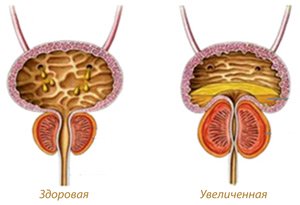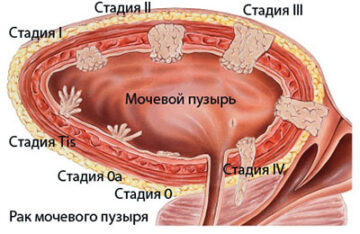
Recently, this disease develops in an increasing number of men. And what is remarkable, according to statistics, the ailment affects mainly elderly people. But this is due only to the fact that the disease is usually diagnosed late. Therefore, with the first unpleasant symptoms, you should consult a doctor, because treatment at the initial stages is easier and gives better results until complete recovery.
Prostate adenoma is also called benign prostatic hyperplasia (BPH). With the development of the disease there is a vast proliferation of tissues, which subsequently leads to the development of tumors. Usually, these processes are associated with age-related hormonal changes, but can be caused by stresses, harmful habits, inflammation in the pelvic organs, obesity, heredity, sedentary lifestyle, increased blood pressure, inadequate nutrition.
Symptoms of prostate adenoma
In the presence of pathological processes, the prostate increases in size, compresses the urinary tract, respectively, urination becomes more complicated.
There are three stages of development of BPH, which are characterized by a certain list of symptoms.
- Stage 1. Increasing urge to urinate, weakening of the urine stream. These symptoms initially slightly affect the man and may remain unnoticed. And for a long time (up to 10 years), he can not even guess that the prostate adenoma is developing. The treatment initiated at this stage usually leads to complete recovery.
- Stage 2. There are difficulties with emptying the bladder. The jet is so weak that it turns into a stream of drops. In this regard, complete devastation of the bladder does not occur, the remaining urine leads to inflammatory processes on the mucosa. The walls of the bladder are deformed, the urine stagnates in the ureters and kidneys. There are painful sensations. A complete fluid retention is possible, which can only be remedied with medical attention. The treatment initiated at this stage usually only restrains the progression of the disease.
- Stage 3. There is a stretching of the bladder, because a large amount of urine accumulates. There is an involuntary urination. There is intoxication of the body, resulting in a man feels nausea, weakness, a constant thirst, constipation develops, there is a smell from the mouth, the body temperature can rise. If you do not treat the disease at this stage, it is possible to develop kidney failure and cystitis, in the kidneys stones are formed. Over time, it is possible to degenerate cells into cancers.
Diagnosis of prostate adenoma
The diagnosis of BPH can be confirmed after a physical examination, the results of urine and blood tests (including biochemistry and on the prostate specific antigen), ultrasound of the pelvic organs, urethrocystoscopy (detection of stones and the presence of narrowing of the canal), uroflowmetry (determination of the rate of urination) and scoring on the scale IPSS.
Treatment of prostate adenoma
The Center for Progressive Medicine «AVICENNA MED» applies modern methods of treatment of BPH. The choice of a particular method depends on the stage of the disease and the individual characteristics of the patient.
- Conservative. It occurs through the appointment of drugs: alpha-blockers that normalize urination by relaxing the muscles of the prostate, and other medications that reduce the volume of overgrown tissues.
- Operative. There are two types of surgical intervention:
- Low-traumatic removal of part of the prostate (transurethral resection). Through the urethra, the expanded tissue is removed.
- A hollow operation (adenomectomy). Used in the advanced stages.
To make an appointment with urologists of the Center for Progressive Medicine «AVICENNA MED» and get advice on this issue, you can call:

